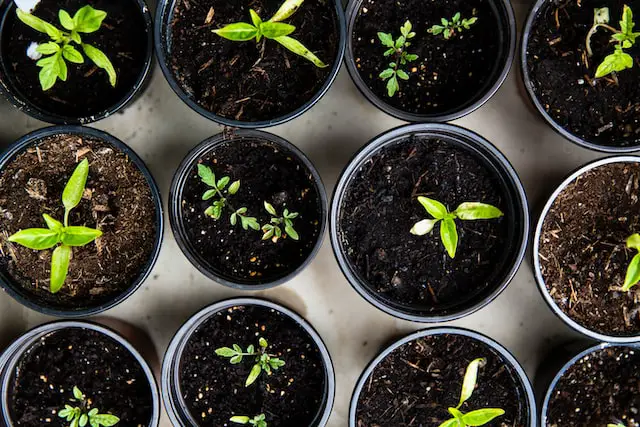Breeder seed is the first generation of a new crop variety that has been developed by a plant breeder. Certified seed is a second-generation seed that has been produced from breeder seed and has met certain standards set by a seed certification agency. The main difference between breeder seed and certified seed is that certified seed is subject to more quality control measures than breeder seed.
What is a breeder seed?
(Photo by Binyamin Mellish)

Breeder seed is a step down from Certified seed in terms of quality. breeder seed is produced from parent plants that are not as closely monitored as those used for Certified seed. As a result, breeder seed may not be as disease- or pest-resistant as Certified seed.
Breeder seed is produced by the original developer of a new variety of plants. It is also more genetically pure than Certified seeds. This means that it will produce plants that are more uniform in appearance and characteristics.
What is a certified seed?
(Photo by Joshua Lanzarini on Unsplash )

Certified seed is a type of seed that has been through a certification process to ensure that it meets certain standards. The standards that certified seed must meet vary from country to country, but in general, the certification process ensures that the seed is of high quality and is free from disease.
Certified seed must be produced by a certified seed producer, who must follow strict guidelines set by the government or certification body. The certification process usually includes testing of the seed to ensure its quality and freedom from disease. Once the seed has been certified, it can then be sold to farmers and other growers.
Certified seed is often more expensive than non-certified seed, but many farmers feel that the extra cost is worth it, since they can be sure they are getting a high-quality product. In some cases, certified seed may also have higher yields than non-certified seed, since the plants grown from them are more likely to be healthy and vigorous.
Breeder seed Vs. Certified seed – Key differences
Purpose:
Breeder Seed: Breeder seed is the initial generation of a new variety developed by plant breeders through careful selection and controlled breeding techniques. Its primary purpose is to serve as the foundation for further seed production.
Certified Seed: Certified seed is the progeny of breeder seed that has undergone multiple stages of controlled production, testing, and quality assurance. Its purpose is to provide farmers with high-quality seeds for commercial cultivation.
Seed Purity:
Breeder Seed: Breeder seed has the highest level of genetic purity and uniformity among seed categories. It is carefully maintained to preserve the desired traits of the new variety being developed.
Certified Seed: Certified seed also possesses a high degree of genetic purity and uniformity. However, it may have minor variations due to natural factors such as cross-pollination.
Seed Production and Distribution:
Breeder Seed: Breeder seed is produced and maintained by the plant breeders or specialized organizations. It is not typically available for commercial distribution but is used as the source for producing foundation seed.
Certified Seed: Certified seed is produced and distributed by authorized seed production agencies or seed companies. It undergoes strict quality control measures to ensure its purity and meets established standards for certification.
Seed Certification:
Breeder Seed: Breeder seed is not certified, as its purpose is to create new varieties and act as the source of higher-generation seeds.
Certified Seed: Certified seed goes through an official certification process conducted by designated authorities or agencies. It involves field inspections, laboratory testing, and adherence to specific standards to obtain the certified seed status.
Availability and Price:
Breeder Seed: Breeder seed is generally not available to farmers for direct purchase. It is primarily used by seed producers to multiply and produce foundation seed.
Certified Seed: Certified seed is available for purchase by farmers and is widely distributed through seed companies, agricultural institutions, and authorized dealers. It is priced based on factors such as seed quality, demand, and market conditions.
Breeder seed is the initial pure seed stock developed by breeders for creating new varieties, while certified seed is the result of multiple stages of controlled production and testing, intended for commercial use. Both types of seeds play vital roles in ensuring the availability of high-quality seeds for agricultural production.
The advantages and disadvantages of using certified seeds
Advantages of Using Certified Seeds:
- Genetic Purity and Quality: Certified seeds are produced from breeder seeds and undergo rigorous quality control measures. They exhibit high genetic purity, ensuring that the desired traits of the variety are preserved. This leads to improved crop performance, higher yields, and better overall quality.
- Improved Crop Uniformity: Certified seeds are selected for their uniformity, which results in plants that have consistent growth, maturity, and characteristics. This uniformity facilitates easier crop management, including irrigation, fertilization, and pest control.
- Disease and Pest Resistance: Certified seeds are often bred to possess resistance or tolerance to specific diseases, pests, or environmental stresses. By using certified seeds, farmers can reduce the risk of crop losses due to these factors, minimizing the need for excessive pesticide use.
- Increased Productivity: Certified seeds have the potential to significantly increase agricultural productivity. They are developed to exhibit desirable traits such as high yields, early maturity, improved nutritional content, or specific agronomic characteristics. By planting certified seeds, farmers can maximize their crop production and profitability.
- Access to New Varieties: Certified seeds often include newly released or improved varieties developed through breeding programs. These varieties may offer enhanced traits such as drought tolerance, disease resistance, or improved marketability. Using certified seeds allows farmers to access and benefit from these advancements in agricultural technology.
Disadvantages of Using Certified Seeds:
- Cost: Certified seeds generally come at a higher cost compared to traditional farm-saved seeds or non-certified seeds. The additional expenses account for the quality control measures, certification process, and investments made by seed producers. This cost may pose a financial challenge for resource-constrained farmers.
- Limited Availability: Availability of certified seeds might be limited for certain crops or specific varieties, especially in remote or underdeveloped regions. Farmers may face challenges in accessing the required certified seeds, leading them to rely on alternative seed sources.
- Dependency on Seed Suppliers: When farmers consistently use certified seeds, they become dependent on seed suppliers to meet their seed requirements. This reliance may restrict their freedom to save seeds from their own harvests for future planting, potentially reducing their seed security and self-sufficiency.
- Adaptability and Local Conditions: Certified seeds may not always perform optimally in all agro-climatic conditions or farming systems. While they are selected and tested under controlled conditions, their adaptability to diverse local environments can vary. Farmers need to consider factors such as soil types, climate, and farming practices when choosing the appropriate certified seeds.
- Lack of Crop Diversity: Depending solely on certified seeds may limit crop diversity on farms. This reduction in genetic diversity can increase vulnerability to pests, diseases, and environmental changes. It is important to balance the use of certified seeds with the preservation of local landraces and traditional crop varieties.
It is crucial for farmers to carefully evaluate the advantages and disadvantages of using certified seeds based on their specific farming context, economic viability, and long-term sustainability goals.
The advantages and disadvantages of using Breeder seeds
Advantages of Using Breeder Seeds:
- Genetic Purity and Uniqueness: Breeder seeds are the initial generation of seeds developed by plant breeders through controlled breeding techniques. They possess the highest level of genetic purity and uniformity among seed categories. Using breeder seeds ensures that the desired traits of the new variety are preserved and can lead to the development of unique and improved crop varieties.
- Potential for Variety Development: Breeder seeds serve as the foundation for the development of new crop varieties. By using breeder seeds, plant breeders and researchers can continue the breeding process to create improved varieties with desired traits such as higher yields, disease resistance, improved nutritional content, or better adaptability to specific environments.
- Adaptability and Localized Varieties: Breeder seeds allow for the development of crop varieties specifically bred to adapt to local agro-climatic conditions and farming systems. By focusing on breeding for local needs, breeders can create varieties that are better suited to the challenges and constraints faced by farmers in a particular region.
- Potential for Innovation: Breeder seeds provide opportunities for innovation and advancements in agricultural technology. Through selective breeding, researchers can introduce new traits and characteristics into crop varieties, contributing to increased productivity, sustainability, and resilience in agriculture.
- Seed Industry Development: Breeder seeds play a crucial role in the seed industry by serving as the source of higher-generation seeds. They are used to produce foundation seeds, which further multiply to produce certified seeds for commercial distribution. The availability and use of breeder seeds contribute to the development and growth of the seed industry.
Disadvantages of Using Breeder Seeds:
- Limited Availability: Breeder seeds are not readily available for direct purchase by farmers. They are primarily used and maintained by plant breeders or specialized organizations for research and further seed production. Farmers may need to rely on seed companies or institutions for access to higher-generation seeds derived from breeder seeds.
- Technical Expertise Required: Utilizing breeder seeds requires technical expertise in plant breeding and seed production. Farmers may need to collaborate with plant breeders or institutions with specialized knowledge to ensure the proper handling, multiplication, and maintenance of breeder seeds for subsequent seed production.
- Time and Investment: The process of developing new varieties through breeding and utilizing breeder seeds is time-consuming and requires significant investment in research, infrastructure, and human resources. It can take several years of selection and evaluation before new varieties are released for commercial use.
- Uncertainty and Variation: Breeder seeds, while exhibiting high genetic purity, may still have minor variations due to natural factors such as cross-pollination. This can result in slight variations in the characteristics of the progeny. Farmers using breeder seeds should be prepared for potential variations in crop performance and adaptability.
- Limited Diversity: Depending solely on breeder seeds for crop production may limit the diversity of crops on farms. It is important to balance the use of breeder seeds with the preservation of local landraces and traditional crop varieties to maintain genetic diversity and resilience.
The use of breeder seeds offers opportunities for variety development, innovation, and localized adaptation. However, it requires collaboration with experts, investment in research, and access to higher-generation seeds for commercial cultivation.
Featured Image By – Markus Spiske on Unsplash








